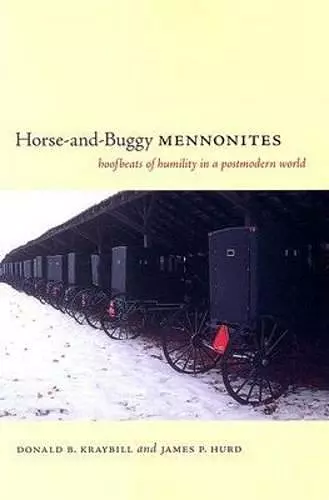Horse-and-Buggy Mennonites
Hoofbeats of Humility in a Postmodern World
Donald B Kraybill author James P Hurd author
Format:Paperback
Publisher:Pennsylvania State University Press
Published:15th Sep '06
Currently unavailable, and unfortunately no date known when it will be back
This paperback is available in another edition too:
- Hardback£50.99(9780271028651)

On a May Sunday in 1927, progress and tradition collided at the Groffdale Old Order Mennonite Church in eastern Pennsylvania when half the congregation shunned the cup of wine offered by Bishop Moses Horning. The boycott of this holiest of Mennonite customs was in direct response to Horning’s decision to endorse the automobile after years of debate within the church. The resulting schism over opposing views of technology produced the group known as the Wenger Mennonites.
In the nearly eighty years since the establishment of this church, the initial group of fifty dissenters has grown to a community of 16,000 Wenger Mennonites. They have large families and typically retain 95 percent or more of their youth. For many years their main community was based in Lancaster County, but in recent decades they have expanded into eight other states, with new communities most recently established in Iowa and Michigan. Despite their continued rejection of modern technology, the Wengers—popularly known as horse-and-buggy Mennonites—continue to thrive on their own terms.
In this first-of-its-kind study of the Wenger Mennonites, Kraybill and Hurd—a sociologist and an anthropologist—use cultural analysis to interpret the Wengers both in and outside Pennsylvania. They systematically compare the Wengers with other Mennonite groups as well as with the Amish, showing how relationships with these other groups have had a powerful impact on shaping the identity of the Wenger Mennonites in the Anabaptist world. As Kraybill and Hurd show, the Wengers have learned that it is impossible to maintain a truly static culture, and so examining the ways in which the Wengers cautiously and incrementally adapt to the ever-changing world around them is an invaluable case study of the gradual evolution of religious ritual in the face of modernity.
“Until now there has not been a comprehensive work on Old Order Mennonite life and culture. With this book Kraybill and Hurd provide not only the first such study, but a first-rate one. Authoritative and accessible, Horse-and-Buggy Mennonites offers rich detail and illuminating comparative analysis. Especially insightful is the authors’ exploration of the connections between mobility and identity.”
—Steven M. Nolt, Goshen College
“The book is superbly written, giving an insightful, thorough, detailed portrayal of Old Order Mennonite life. It is the first of its kind, a monumental contribution.”
—John F. Peters Catholic Historical Review
“Kraybill and Hurd ask all the right questions and answer them in an unaffected yet authoritative fashion. They guide readers through the thicket of church controversies and divisions that led to the birth of the Wengers, and help explain what otherwise appears to be an arbitrary and uneven resistance to modernity.”
—M. A. Olshan Choice
“A few writers have produced books about Old Order Mennonite life, but none as comprehensive as this. This thorough sociological study is the first of its kind of the Wenger Mennonites, the largest of the Old Order Mennonite groups. . . . This book is essential reading for students of American religion and of alternative or sectarian societies. . . . This book belongs in both academic and church libraries, but anyone with more than a casual interest in plain-sect churches will find this book informative and, in places, either disturbing or inspiring, or both.”
—J. Craig Haas Pennsylvania Magazine of History and Biography
“This book is a valuable contribution to the sociology and anthropology of religion, as well as to Anabaptist studies. Furthermore, scholars of communications and rhetoric should also take note of this book as empirical study of how community conflict is engaged and resolved.”
—Jeff Gingerich Mennonite Quarterly Review
“Horse-and-Buggy Mennonites: Hoofbeats of Humility in a Postmodern World is a welcome addition to Anabaptist studies. The specialist and the undergraduate college student will profit from it.”
—B. Richard Page American Journal of General Education
“For those of us who study outsider or dissenting religious communities, this volume provides an excellent scholarly model that might be applied in instructive ways to other religious movements.”
—Stephen J. Stein Journal of Religion
ISBN: 9780271028668
Dimensions: 229mm x 152mm x 25mm
Weight: 594g
376 pages